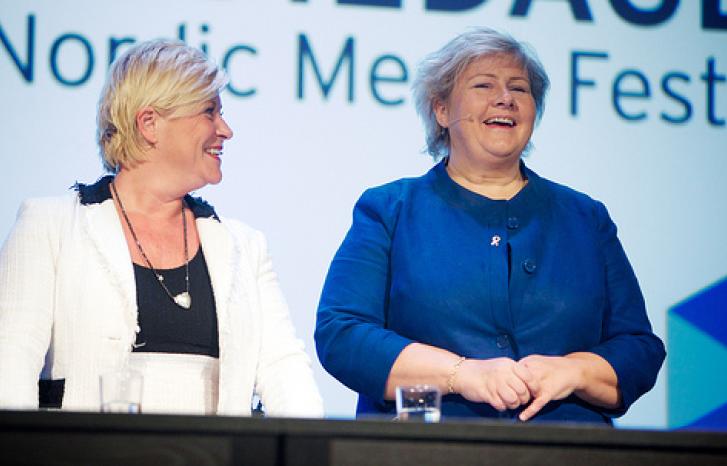In our masters blog, we invite people who have written their master's thesis on gender or with a gender perspective to write a post about their thesis. The writer is responsible for the opinions expressed and academic content. Please contact the editorial team if you would like to contribute: post@kilden.forskningsradet.no.
Sales of sexual images and videos on the OnlyFans platform surged during the COVID-19 pandemic. The platform became an important source of income for sex workers who, for various reasons, could not sell sex physically, or who had lost vital income from other work and wanted to establish themselves in the market.
When I chose to write my master's thesis about OnlyFans, I didn't know what I was getting myself into. No research on this topic had previously been conducted in Norway, and there was very little to be found elsewhere. Sex work, sexuality and gender were fascinating topics on the sociology programme, so I decided to take a chance and write about a highly controversial and topical phenomenon that had barely been research before.
The platform has been the subject of numerous debates and controversies, both nationally and internationally. In the autumn of 2021, OnlyFans announced that all sexual content on the platform was to be banned. This provoked a huge backlash, as it was sexual content that helped generate the platform's popularity and huge revenues. Such a decision would have a direct impact on the lives of many sex workers, not just in financial terms, but also in terms of the safety of those who had to return to physically selling sex. After just a few days, the statement was withdrawn. This resulted in a sharp erosion of trust between the platform and its users, and an uncertain future for sex workers on the platform.
- Master's thesis: "'I don't post porn' - A qualitative study of young Norwegian women's digital sex work on the platform OnlyFans” (Orig. «'Jeg poster ikke porno' - En kvalitativ studie av unge norske kvinners digitale sex-arbeid på plattformen OnlyFans»)
- Place of study: Department of Sociology, University of Bergen
- Year: 2022
Few on top
The media paints a very one-sided picture of kind of person who produces sexual content on OnlyFans. The stereotype is a young woman who earns millions a year and who apparently does not experience any problems or challenges from exposing herself on the internet. I quickly began to doubt this stereotype. What about all those who don't make earn millions? These people were in are a majority. Who is the average user and what have they experienced?
Many people who don’t have any experience with sex work also create OnlyFans profiles. This made me suspicious. At what point did it become so normalised to sell sexual images and videos online? Is it really just "anyone" who is doing this?
Recruitment took time
Looking at OnlyFans in a Norwegian context is challenging. The geographical limitation made the sample size smaller. In addition, the design of the platform, with the messaging function hidden behind a paywall, meant that I could not contact multiple informants directly. I therefore had to use apps such as Instagram, Reddit and Twitter, as users frequently used these apps to advertise their profiles.
OnlyFans creates illusions
I really wanted to study variations between women and men or between different age groups, but it was difficult to find Norwegian users who would be interviewed, so I ended up with five informants. All of them were women aged 18 to 24 who worked or studied alongside producing content on the platform. They were all relatively new to the platform and had been producing content for less than a year.
Four research questions
As a starting point, I had one main research question and four sub-questions. As I had little previous research on which to rely, I collected a broad range of data. During in-depth interviews, I let the interview material guide the direction of the analysis.
Main research question:
How and why do young women use the platform OnlyFans to share sexually explicit photos and videos?
Sub-questions:
What motivated the informants to start using OnlyFans, and what will it take for them to continue their work over time?
How do users market their own profile and how do they retain customers?
What boundaries do users set in their work, and do these boundaries change over time?
What risks does the work entail and how do users mitigate those risks?
OnlyFans creates delusions
The informants were part of what is known as the gig economy, the platform economy, or the "attention economy" (Valla & Schor, 2020). Revenue would increase through increased attention and traffic on one's private profile on the platform.
However, OnlyFans creates an illusion. Although the informants were at the lowest level of the platform’s hierarchy, it creates the illusion that the content creators are at the top.
Boundaries were gradually stretched as income and subscriber numbers declined.
The illusion is created by users being their own boss. They decide what they produce and get to keep 80% of the income, but in reality, each user is one of many competing for attention at the bottom of the hierarchy. Users who produce the most and display the most explicit content get the most clicks.
In order to keep customers interested, the informants' boundaries were continuously stretched . If customers were not satisfied, they could easily subscribe to other profiles.
Boundaries stretched and moved
The huge amount of competition meant that the informants had to set their own boundaries, which were key to their work. They primarily set limits in terms of the type of content they posted. Two key boundaries were about showing their face and genitalia, respectively. None of the informants showed both their face and genitalia on their profile at the same time.
This meant they could avoid being recognised if the images ever fell into the wrong hands. It could, however, adversely affect their income. Customers would often lose interest if they were not willing to reveal the most intimate parts of their body.
The first two months are described as bountiful, but then the income dwindles.
Boundaries were gradually stretched as income and subscriber numbers declined.
In order to justify their work, a number of the informants created a symbolic division between their own and other users’ content on the platform. While "others" posted "porn", they themselves were selling "exclusive pictures" that, in the eyes of the informants, were a form of "soft porn".
Uncertain future
All the informants had uncertainties about the future. The "future" would depend on the platform's longevity, how long they would produce sexual content, and how their current sex work could impact work and relationships. The informants were unsure whether OnlyFans was something to concentrate on in the long term. Content was produced at intervals ranging from daily, to several times a week, or weekly. The first two months are described as bountiful, but then the income dwindles. None of my informants earned a liveable income from OnlyFans. The income was described as "an additional wage" or "an additional grant". Fully investing themselves in OnlyFans was risky in terms of future work. My informants either had a job or were studying.
Want the money
I found a distinction between "extrinsic motivation", such as poor finances or poor mental health, and "intrinsic motivation", stemming from personal interest in the work. Money was a motivation shared by all the informants. Three informants also considered the work to be fun or found that it increased their self-confidence. Two of the informants only did it for the money.
When money was the only motivation, a vision of the future on the platform was shorter. For "June," money was the only motivation, and OnlyFans wasn't part of her vision of the future. It was just something she had to do for a while, despite not enjoying the work. OnlyFans was a guilty secret that only her boyfriend knew about.
More OnlyFans research needed
Research into OnlyFans has barely begun. Given the large amount of exposure in the media, there is a great need for more research data on the subject. The media's glorification of the few users who earn the most is not compatible with the reality for the majority of the platform’s content producers. I hope that more people dare to research less conventional topics, such as digital sex work and OnlyFans!
This article has been translated from Norwegian.



